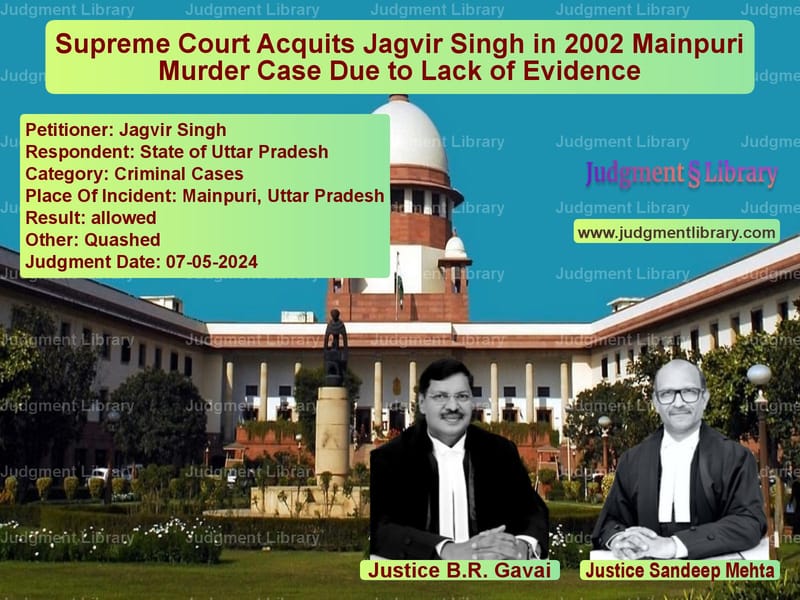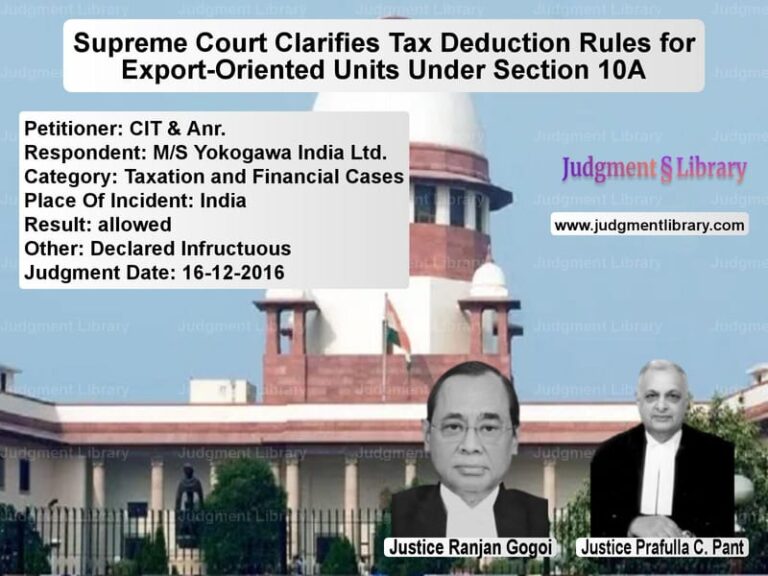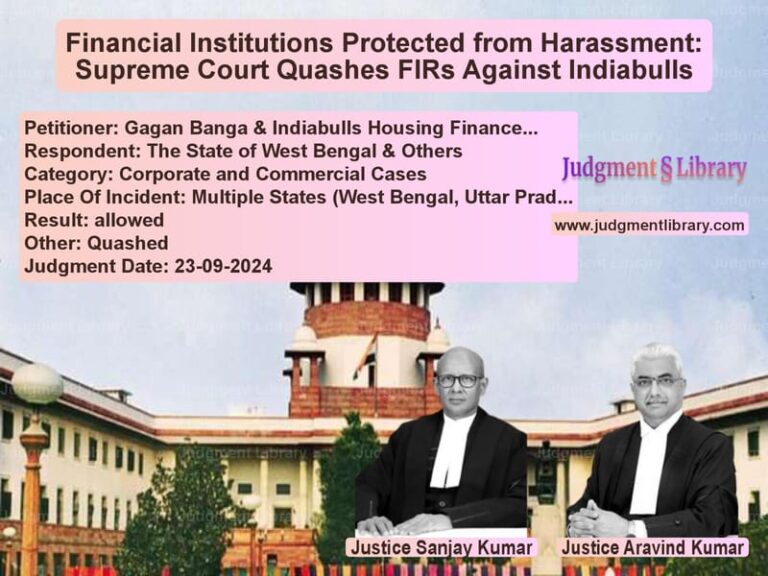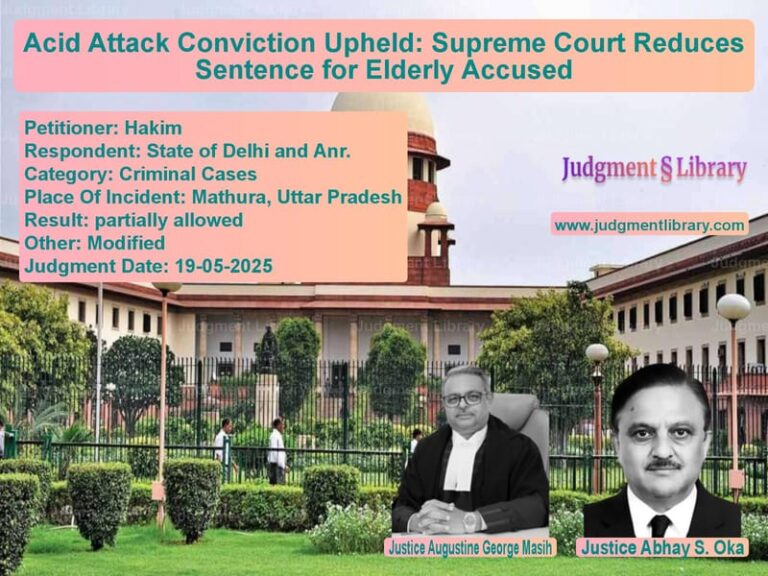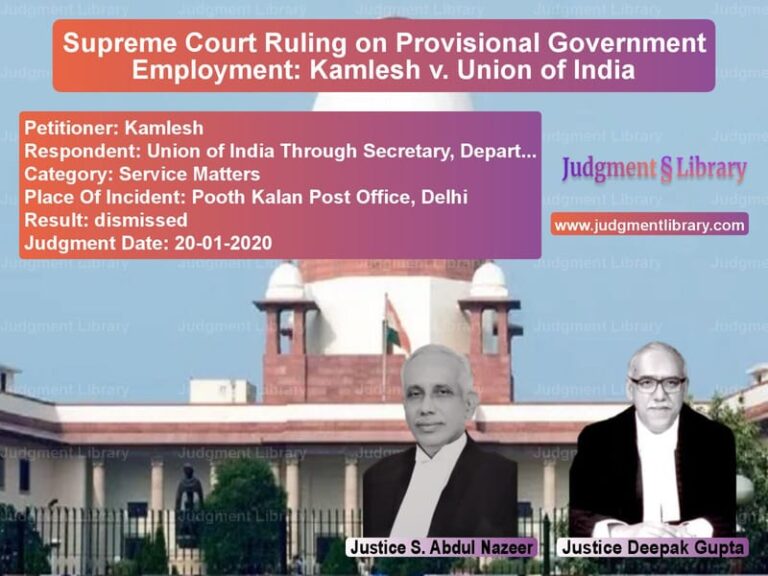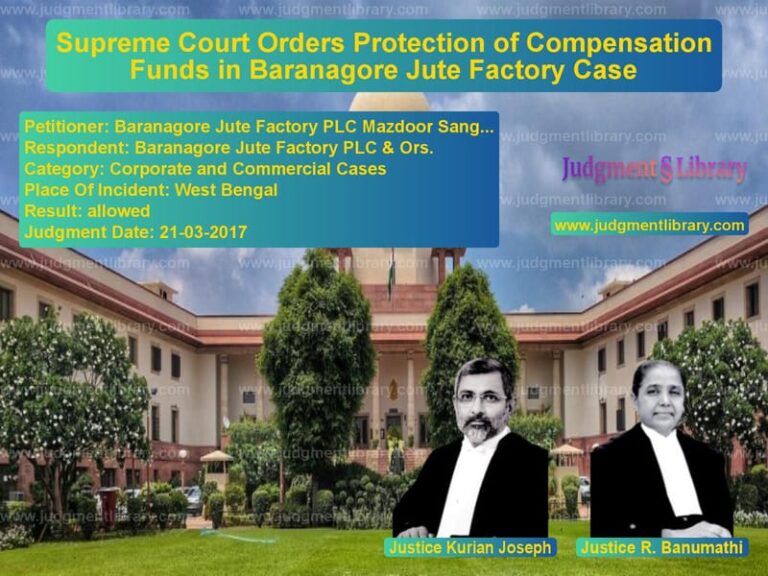Supreme Court Acquits Jagvir Singh in 2002 Mainpuri Murder Case Due to Lack of Evidence
The Supreme Court of India has acquitted Jagvir Singh in the 2002 Mainpuri murder case, overturning the convictions previously upheld by the Allahabad High Court. The Court ruled that the prosecution failed to establish credible evidence proving Jagvir Singh’s involvement in the crime, thereby granting him the benefit of the doubt.
Background of the Case
The case pertains to the alleged murder of Sanju, a resident of Gokulpur village, Mainpuri, Uttar Pradesh. On August 31, 2002, a dispute arose between Sanju and accused Omkar over a piece of land where Sanju had placed a Naand (Hauda). The argument escalated, leading to a fatal shooting.
The prosecution claimed that Jagvir Singh and Omkar fired gunshots at Sanju from the roof of Omkar’s house, causing his death. An FIR was registered at Dannahar Police Station, and Jagvir Singh, along with Omkar and two other accused, was charged under Section 302 IPC (murder) read with Section 34 IPC (common intention).
The Trial Court convicted Jagvir Singh and Omkar on November 25, 2003, sentencing them to life imprisonment and imposing a fine. Two other accused, Durvin and Sobran, were acquitted due to lack of evidence. The conviction was upheld by the Allahabad High Court on May 10, 2019, leading to this appeal before the Supreme Court.
Key Issues Before the Supreme Court
- Whether the prosecution had proved beyond reasonable doubt that Jagvir Singh fired at the deceased.
- Whether the testimony of eyewitnesses was reliable and consistent.
- Whether the conviction could be sustained based on circumstantial evidence.
Arguments by the Appellant (Jagvir Singh)
- The eyewitnesses, Ram Prakash (PW-1), Sultan Singh (PW-2), and Ram Naresh (PW-5), were not present at the crime scene and their testimonies were fabricated.
- The alleged firing took place on the roof of Omkar’s house, while the deceased was on the roof of Ram Naresh’s house. The distance between these locations made it impossible for the eyewitnesses to clearly observe the incident.
- There was no forensic evidence linking Jagvir Singh to the crime.
- The prosecution failed to prove motive beyond reasonable doubt.
Arguments by the Respondent (State of Uttar Pradesh)
- The prosecution relied on the testimony of three eyewitnesses who consistently stated that Jagvir Singh and Omkar fired at Sanju.
- The presence of gunshot wounds confirmed that the deceased had been shot from a distance, consistent with the eyewitness accounts.
- The acquittal of two co-accused did not impact the conviction of Jagvir Singh, as his involvement was independently established.
Supreme Court’s Observations
The bench, comprising Justices B.R. Gavai and Sandeep Mehta, closely examined the evidence and found several inconsistencies:
- The eyewitnesses admitted during cross-examination that they were not in a position to clearly see who fired the gunshots.
- There was a significant distance between the houses of Omkar and Ram Naresh, making it difficult for the witnesses to make accurate identifications.
- The FIR and initial witness statements contradicted later testimonies, casting doubt on the credibility of the prosecution’s case.
- The postmortem report did not conclusively establish that Jagvir Singh was responsible for the fatal shot.
The Court cited past judgments affirming that in cases of grave doubt, the accused must be given the benefit of the doubt:
- Selveraj v. State of Tamil Nadu (1976) 4 SCC 343: The conviction must rest on clear, cogent, and reliable evidence.
- Narne Rama Murthy v. Ravula Somasundaram (2005) 6 SCC 614: When limitation is a pure question of law, courts must decide accordingly.
Final Judgment
The Supreme Court ruled:
- The appeal was allowed and the conviction was set aside.
- Jagvir Singh was acquitted and ordered to be released immediately.
- The prosecution had failed to prove guilt beyond reasonable doubt.
- No costs were awarded, and the judgment would not serve as a precedent for future cases.
Implications of the Judgment
- The ruling reaffirms that convictions must be based on conclusive evidence, not just witness statements.
- It sets a precedent for evaluating eyewitness credibility in murder cases.
- The judgment underscores the principle that in cases of doubt, the benefit must go to the accused.
Conclusion
The Supreme Court’s judgment in Jagvir Singh v. State of U.P. highlights the importance of rigorous evidence scrutiny in criminal trials. By acquitting Jagvir Singh, the Court reaffirmed that mere suspicion cannot take the place of legal proof in securing a conviction.
Petitioner Name: Jagvir Singh.Respondent Name: State of Uttar Pradesh.Judgment By: Justice B.R. Gavai, Justice Sandeep Mehta.Place Of Incident: Mainpuri, Uttar Pradesh.Judgment Date: 07-05-2024.
Don’t miss out on the full details! Download the complete judgment in PDF format below and gain valuable insights instantly!
Download Judgment: jagvir-singh-vs-state-of-uttar-prade-supreme-court-of-india-judgment-dated-07-05-2024.pdf
Directly Download Judgment: Directly download this Judgment
See all petitions in Murder Cases
See all petitions in Bail and Anticipatory Bail
See all petitions in Custodial Deaths and Police Misconduct
See all petitions in Attempt to Murder Cases
See all petitions in SC/ST Act Case
See all petitions in Judgment by B R Gavai
See all petitions in Judgment by Sandeep Mehta
See all petitions in allowed
See all petitions in Quashed
See all petitions in supreme court of India judgments May 2024
See all petitions in 2024 judgments
See all posts in Criminal Cases Category
See all allowed petitions in Criminal Cases Category
See all Dismissed petitions in Criminal Cases Category
See all partially allowed petitions in Criminal Cases Category

